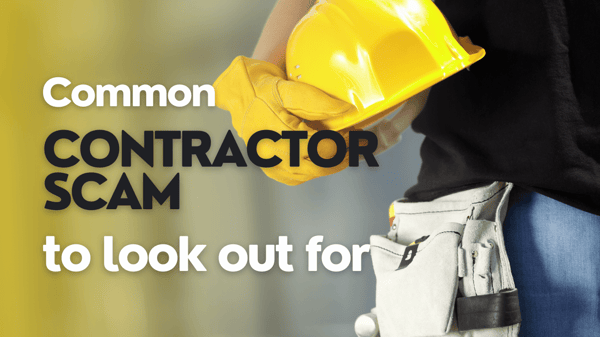
When it comes to home improvement projects or renovations, finding a trustworthy and reliable contractor is essential. For investors implementing the BRRRR Method, a good contractor can make or break your success. Unfortunately, the contracting industry has its fair share of scammers looking to exploit unsuspecting homeowners.
These fraudulent individuals or companies employ various tactics to deceive homeowners and make off with their hard-earned money. Let's take a look at some common contractor scams, signs to look it out for, and ways to protect yourself from falling victim to these fraudulent practices.
Signs of Contractor Fraud
Be wary of some of the following signs of contractor schemes, and use our tips to protect yourself.
Unscrupulous Contractors Ask for Upfront Payment
One of the most prevalent examples of contractor fraud involves the upfront payment scheme. If a contractor asks for a significant portion or even the full amount of the project cost upfront before commencing work, think twice about working with them. Often some of the bad apples will bolt once they receive the payment, without completing the job or even starting it.
To avoid this scam, be cautious about contractors who demand full payment before any work has begun. A reputable contractor typically requires a down payment or progress payments as the project advances. According to Angi, many states have limits on how much contractors can make upfront. If your state doesn't have a limit, Angi says between 10% and 15% of the project cost is appropriate.
A Low Bid is a Red Flag
Yes, some prices are too good to be true. Another common scam is low-ball bidding. Con artists intentionally provide unusually low estimates to entice homeowners and secure the project. Once the contract is signed, they may start adding additional charges for unexpected issues or materials, inflating the total cost beyond what was initially agreed upon. To protect yourself, obtain multiple quotes and thoroughly scrutinize the details of each bid. Be skeptical of significantly lower bids compared to others, as they may indicate hidden costs or subpar work quality.
A Contractor's License and Insurance is Non-Negotiable
Hiring unlicensed or uninsured contractors puts homeowners at significant risk. Scammers may pose as legitimate contractors, but without proper licensing or insurance, they lack the necessary qualifications and coverage to protect you and your property. Always verify a contractor's license number and insurance information before hiring them. Contact the relevant authorities or licensing boards to ensure their credentials are valid and up to date.
Permits are Necessary
Scheming contractors try to justify that a permit isn't necessary or try to talk you into a homeowner's permit rather than a building permit. The homeowner is responsible for all the work done in a homeowner's permits, so never agree to that! As a rule of thumb, always get a second opinion.
More Changes = More Dollars
Even if you are working with a legitimate contractor, be cautious of any suggestions about large upgrades or more expensive materials. Never agree to anything or let the contractor start any work without revisiting the contract. Even the slightest change should be agreed upon in the contract.
Are "Surprise" Project Issues Really Surprises?
It is true that unexpected issues come up during construction. However, scheming contractors will make up structural problems, bug infestations, or anything to upcharge you for extra work. Some of these may be legitimate, but it is always a good idea to get a home inspection and confirm.
Substandard Work is a Bad Sign
Unscrupulous contractors may deliver substandard workmanship or use inferior materials, which can lead to costly repairs in the future. These scammers often prey on homeowners who are unfamiliar with construction or renovation practices. To avoid falling victim to this scam, research and educate yourself about the project requirements, materials, and industry standards. Additionally, ask for references from a previous job and check online reviews to ensure the contractor has a solid reputation for quality work.
The Homeowner Should NOT Have to Make an Immediate Decision
A good contractor will not pressure you into signing a contract in a short turnover period. As a rule of thumb, don't sign anything that makes uneasy. The right contractor will be flexible on when you sign any written agreement. Further, there should not be any limited time offers when working with a contractor, and there is no such thing as soliciting work due to materials left from another job. Use your best judgement in these scenarios and always do due diligence. A good place to check is the Better Business Bureau.
Summary
Contractor scams are an unfortunate reality, but with awareness and due diligence, you can protect yourself from falling victim. Remember to research contractors thoroughly, seek multiple bids, and verify credentials before making any commitments. Trustworthy contractors will be happy to provide references, proof of insurance, and a written contract detailing the scope of work and payment terms. By staying informed and cautious, you can ensure that your home improvement projects are completed by reputable professionals who have your best interests at heart.
In a world where scams are prevalent, it's crucial to be vigilant and take necessary precautions to safeguard yourself and your investment. Don't let the actions of a few dishonest individuals overshadow most contractors who are reputable dedicated to running a trustworthy business.
Related: Avoid a Contractor Scam Post Florence. 10 Essentials for a Landlord Toolbox

